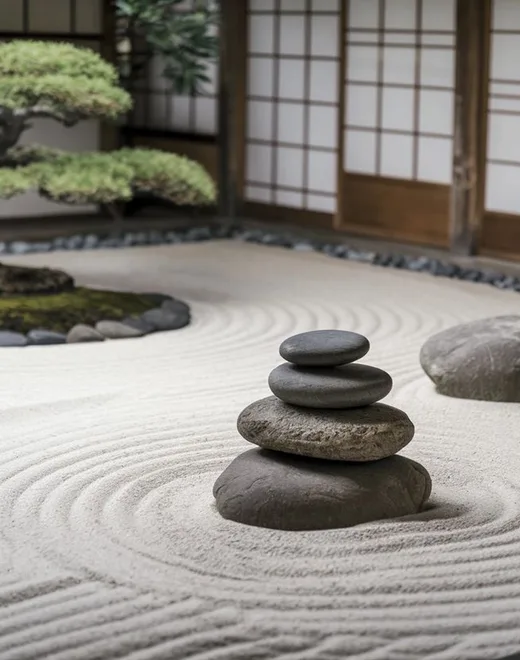Beyond Productivity: Secular Buddhist Views on Work-Life Balance
Apr 13, 2025 • 7 min read
Ever notice how even when you check everything off your to-do list, that sense of accomplishment lasts about five minutes before you're stressed about the next thing? All of us are caught in a constant push to be more productive, to optimize every minute of our day, and to somehow find that mythical work-life balance everyone talks about. But secular Buddhist wisdom offers a surprisingly different take on how we might approach this modern challenge - one that might actually help us find the peace we're looking for.
Rethinking What Balance Really Means
Let's be honest - most advice about work-life balance feels like it's just adding more items to our already overwhelming to-do list. Meditate for 20 minutes, exercise for 30, meal prep for the week, quality time with family, and somehow excel at work too. It's exhausting just thinking about it. No wonder so many of us feel like we're failing at this balance thing before we even start.
Buddhist psychology sees this differently. Instead of trying to perfectly balance all these competing demands, it suggests we're asking the wrong question entirely. The issue isn't about finding the perfect schedule or routine - it's about our relationship with work, time, and what we think makes a life worthwhile. When we dig deeper, we often find that our stress comes less from our actual workload and more from our ideas about what we should be accomplishing.
This perspective shift can be revolutionary. Rather than seeing balance as something we achieve through careful planning and scheduling, we might start seeing it as something that emerges naturally when we stop fighting against reality. Think about how much energy we spend trying to control everything in our lives - what if we could redirect some of that energy toward actually living?
The Productivity Trap
Here's something that might sound familiar: You finally have a productive day, getting through tons of work, but instead of feeling satisfied, you're already worried about maintaining that pace tomorrow. Or maybe you take a break, only to feel guilty about not using that time "productively." This is what Buddhists would call the hunger of never enough - and it's exhausting us.
What's really going on here? We've bought into the idea that our worth is tied to our productivity. Every notification, every email, every meeting request feeds into this belief that we should always be doing more. Social media doesn't help either - we're bombarded with images of people who seem to have it all figured out, running successful businesses while maintaining perfect homes and hitting the gym daily.
This constant striving comes at a cost. We're seeing record levels of burnout, anxiety, and dissatisfaction, even among people who seem to "have it all" from the outside. The more we chase productivity, the further we get from actual contentment. It's like trying to quench your thirst with salt water - the more you drink, the thirstier you become.
The thing is, this isn't just about work habits. It's about a deeper misunderstanding of what makes life meaningful. Buddhist teaching points out that this endless pursuit of more - more accomplishments, more recognition, more productivity - is based on a fundamental misconception that getting these things will finally make us happy.
A Different Way of Looking at Work
Buddhist thinking offers a refreshing perspective here. Instead of seeing work as something separate from life that needs to be "balanced," it suggests looking at how we bring awareness to whatever we're doing in the moment. This isn't about working less or more - it's about changing how we relate to work itself.
Think about how often you're physically at work but mentally somewhere else - either worried about future tasks or rehashing past events. This divided attention not only makes us less effective but also increases our stress. When we're answering emails while thinking about an upcoming meeting while also worrying about a project deadline, we're not really doing any of those things well.
The alternative? Bringing full attention to whatever we're doing right now. When you're working on a report, just work on the report. When you're in a meeting, be fully in the meeting. When you're taking a break, actually take a break. This might sound simple, but it's revolutionary in practice.
This approach doesn't mean you'll never plan ahead or review past actions. Instead, it means doing those things intentionally, with full awareness, rather than letting your mind constantly bounce between past, present, and future.
The Myth of Multitasking
Here's a truth that might be hard to swallow: multitasking isn't real. Our brains actually can't focus on multiple things at once - we're just switching attention really fast, and it's wearing us out. Buddhist practice has been pointing this out for centuries, long before neuroscience confirmed it.
Each time we switch tasks, there's a cognitive cost. It's like having dozens of browser tabs open - your computer slows down trying to keep them all running. Our brains work the same way. When we try to juggle multiple tasks, we're not being more productive; we're just creating more mental strain.
Think about the last time you tried to have a meaningful conversation while checking your phone. Neither activity got your best attention, and chances are you felt more scattered afterward. This scattered attention doesn't just affect our work quality - it impacts our ability to feel satisfied with what we're doing.
Finding Natural Balance
The secret to work-life balance might not be about perfect scheduling or productivity hacks. Instead, it could be about learning to recognize when we're getting caught up in the cycle of endless doing. This awareness itself often leads to more natural, sustainable ways of working and living.
Consider how nature maintains balance - not through rigid control but through constant adjustment and adaptation. Sometimes there's more sunlight, sometimes less. Sometimes more rain, sometimes drought. Yet overall, natural systems find balance through responsiveness rather than control.
We can apply this same principle to our work lives. Instead of trying to maintain perfect balance all the time (an impossible task), we can learn to recognize when we're tipping too far in one direction and make adjustments. This might mean recognizing when we need to step back from work, or conversely, when we need to apply more focused effort.
The Role of Mindful Technology Use
In our digital age, any discussion of work-life balance has to address our relationship with technology. Our phones and computers can be incredible tools for productivity, but they can also become sources of constant distraction and stress.
Buddhist principles of mindful attention can help here too. Instead of letting technology control our attention, we can make conscious choices about how and when we engage with our devices. This might mean:
- Creating designated times for checking email rather than responding to every notification
- Setting up clear boundaries between work and personal communication
- Regular digital detox periods where we step away from screens entirely
- Using technology intentionally rather than habitually
The goal isn't to reject technology but to use it in ways that support rather than undermine our wellbeing.
Practical Steps (Without Adding More Stress)
Instead of giving you another list of things you "should" do, here's a simpler approach: Start paying attention to how you actually spend your energy throughout the day. Notice what activities genuinely replenish you and what depletes you. This isn't about judgment - it's about understanding.
Try this experiment: For one week, notice the moments when you feel most engaged and alive at work. Also notice when you feel drained or scattered. What patterns do you see? Often, we discover that our energy has less to do with the actual task and more to do with how we're approaching it.
Some questions to consider:
- When do you feel most focused and engaged?
- What times of day are naturally more productive for you?
- What activities consistently drain your energy?
- When do you feel genuinely refreshed after taking a break?
Making Peace with Imperfection
Here's something you won't hear from productivity gurus: maybe perfect balance isn't the goal. Life naturally goes through periods of intensity and periods of rest. Fighting against these natural rhythms often creates more stress than it solves.
Buddhist wisdom suggests that true contentment comes not from achieving perfect balance, but from making peace with life's natural ebbs and flows. This doesn't mean giving up on improvement - it means approaching it with more wisdom and less struggle.
Sometimes work will demand more of our attention. Other times, personal life will take priority. The key is learning to flow with these changes rather than fighting against them. This adaptability, paradoxically, often leads to better outcomes than rigid adherence to any particular system.
Moving Forward
The next time you feel overwhelmed by trying to balance everything, remember that the goal isn't to do everything perfectly. It's to bring more awareness and wisdom to whatever you're doing right now. Sometimes, that might mean working intensely on a project. Other times, it might mean recognizing you need rest.
Start small. Pick one area where you feel the most stress around work-life balance and try bringing mindful awareness to it. Notice what happens when you stop trying to force balance and instead let it emerge naturally from paying attention to what's actually needed in each moment.
Remember, the Buddhist approach to work-life balance isn't about adding more to your plate - it's about changing how you relate to what's already there. This shift in perspective might just be the key to finding the balance you've been looking for all along.
DISCLAIMER: All articles, information, and other content on our website is for informational purposes only and is not a substitute for medical advice, diagnosis, or treatment. If you are experiencing mental health challenges or have concerns about your mental or physical health, please consult a qualified healthcare professional. Learn more →


